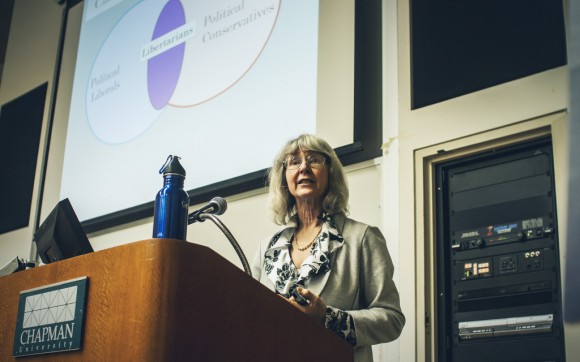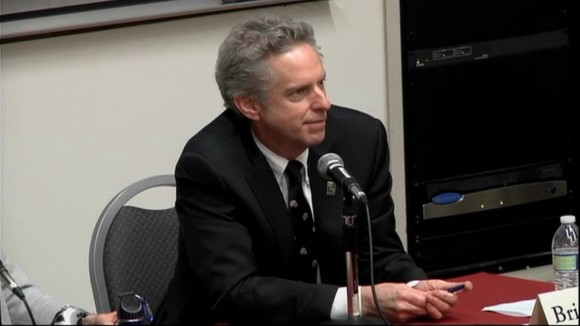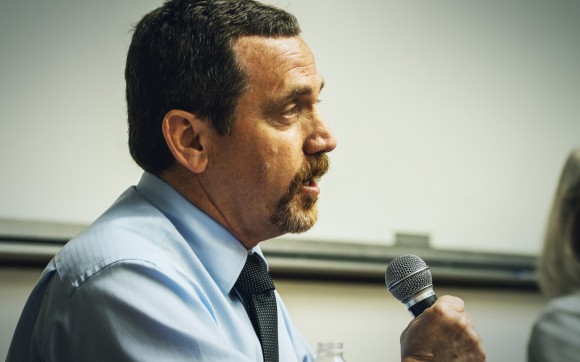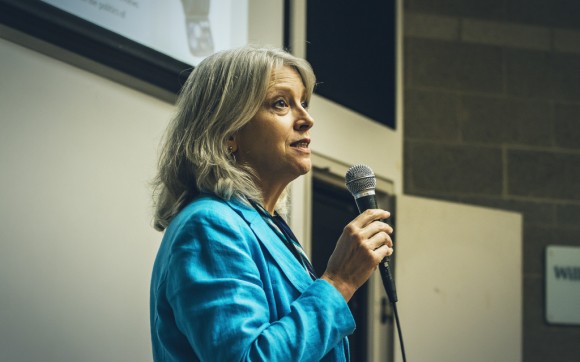NCSE: Scientific Education in Evolution and Climate Change Is Worth Fighting For
February 19, 2014
On Friday, February 7, 2014, leading activist from the
National Center for Science Education
(NCSE) hosted a brief panel discussion on evolution and climate change at Chapman University. The discussion of topics included the reasons why educators should continue to teach and design curriculum based on the scientific findings, and why there is so much resistance toward the teaching of these two topics. The NCSE is a not-for-profit, membership organization providing information and resources for schools, parents, and concerned citizens working to keep evolution and climate science in public school science education.
The full panel discussion can be viewed by clicking here.

NCSE Executive Director Emeritus, Eugenie C. Scott, Ph.D.
Image source: http://scottquent.in/portfolio/ncse-panel/
Executive Director Emeritus,
Eugenie C. Scott, Ph.D
. presented the reasons why there is a push back against the teaching of evolution and climate change based on the four pillars of rejection: scientific, ideological cultural and political arguments. The scientific and cultural rejection of evolution and climate change argues that the “jury is still out,” and that that for every scientist that argues that evolution and climate change are real and measurable in our reality, there are an equal amount of scientist that argue that evolution and climate change are false concepts. Therefore we should allow all points of view to teach about evolution and climate change, and that we should not shut out scientists who have opposing viewpoints to evolution and climate change. Dr. Scott, argues that there is a concept of a culture of fairness in American which argues that all viewpoints should be heard equally, even if it contradicts an overwhelming preponderance of scientific evidence and research. Popularity or unpopularity of a topic should not dictate the curriculum.
The resistance of teaching the theories of evolution and climate change in the classroom is also driven by political and religious ideologies. The major resistance of the teaching of evolution in the classroom comes from the “religious right,” that consists of fundamentalist religious beliefs and conservative political values who see evolution as a threat to their belief system. Similarly, the push back for teaching about climate change comes from political conservatives, and some libertarian economist who see the teaching of climate change as a threat to the free market and capitalism.
Dr. Eugenie Scott argued that it is time to let the experts in these two fields design the course work and curriculum in schools, and remove political and ideological opinions from the design of scientific education. This argument is not a bashing of political and religious ideologies. Ideologies are very important and help individuals frame the world and beliefs. “The problem is that ideologies can put blinders on us and keep us from seeing actual empirical evidence when it contradicts our ideologies, and that is what we have to try really-really hard to overcome.”
Executive Director of NCSE
Ann Reid, Ph.D.,
and moderator for the panel discussion, challenged the audience to examine the
Bill Nye / Ken Ham
debate and look for the numerous examples of Ken Ham using each one of the pillars of rejection in his argument. In the debate, Ken Ham shows examples Ph.D’s who he claimed were creationist. “He talked about how liberals have high jacked the term science and defined in a way that has kept creationism out of the class room” as part of his cultural augment of fairness.

Brian Alters, Ph.D., President of NCSE, and Professor at Chapman University College of Educational Studies
Image source: http://scottquent.in/portfolio/ncse-panel/
Brian Alters, Ph.D.,
President of NCSE, and Professor at
Chapman University College of Educational Studies
, concurred with Dr. Scott and presented on the flaws of the intelligent design (ID) argument. “It is like your auto mechanic, he looks for why the car engine broke down. He doesn’t look for a supernatural cause for it.” Dr. Alters continues to state that intelligent design does not get to be in the schools. It has to play the game of science to be allowed in the schools. “We (ID) don’t state the ‘who’, ‘what’, ‘when’, ‘where’ or ‘why’ but we want to call ourselves science. No. Science is testable and measurable as defined by the scientific community.” Intelligent design is religion.
Ben Santer, Ph.D.,
of the Lawrence Livermore National Laboratory, Member of the National Academy of Sciences, and NCSE Board Member has dedicated his career in identifying the human factors influencing climate changes. The biggest culprit of the human factors causing climate change is the rise in use of fossil fuels, such as carbon dioxide. The burning of fossil fuels causes the greenhouse effect, which traps carbon dioxide into the Earth’s atmosphere causing a rise in surface temperatures.

Ben Santer, Ph.D., of the Lawrence Livermore National Laboratory, Member of the National Academy of Sciences, and NCSE Board Member
Image source: http://scottquent.in/portfolio/ncse-panel/
“These are not belief systems, these are scientific facts. We know beyond a shadow of a doubt that human activity has changed the chemical composition of the Earth’s atmosphere, and the big question has always been, ‘well, how much climate change has arisen because of human activity?’, not ‘is there a human effect on climate change?’”
Dr. Santer stated that climate change is not a hoax, and that scientist are not researching climate change for the pursuit of money and fame as global warming opponents claim. The bottom line is that researchers want to get the science right and provide evidence for the causes, and effects of climate change, and how it will impact everyone’s lives. “Some things are worth fighting for, and clear public understanding of the nature and causes of climate change, that’s worth fighting for.”
The majority of the audience in attendance embraced the facts presented by Dr. Santer that climate change is real and where enthusiastically interested in solutions. Dr. Santer responded to one question posed by an audience member regarding climate change and the economy. Dr. Santer stated that there is false belief system regarding reduction of the effects of climate change at the sacrifice of the economy. That is a false dichotomy, “In my opinion, the people and the countries that figure out cheap and efficient ways of providing low carbon energy to the world will be the leaders of the 21
st
century. We have a very clear choice: Either we want to be leaders or followers. I hope here in the United States that we want to be leaders. I do believe that there are many things we can do to incentivize the development of cheap low carbon energy.” “The best thing we can all do is inform ourselves about the science. Without that sound scientific understanding we are not going to be capable of taking wise decisions on, what to do about the climate change problem, and other large environmental problems. “
Dr. Ann Reid concluded the panel presentation by stating that educators should care, and should continue to fight for science education in the classroom. “Science is useful. Science is correctable. Science makes predictions…If they (scientist) see an abnormality they go and try to figure out what is going on and collect the data to advance the case. When you come out of school, you need to understand how scientists know things. You need to be inoculated against this idea that science is somehow an opinion that scientist hold because they think if they hold the right opinion they will get grant money. You need to understand how scientist think and how they prove what they’re saying because evolution and climate change are not going to be the only issues that are politicized over time or that face ideological opposition. “


